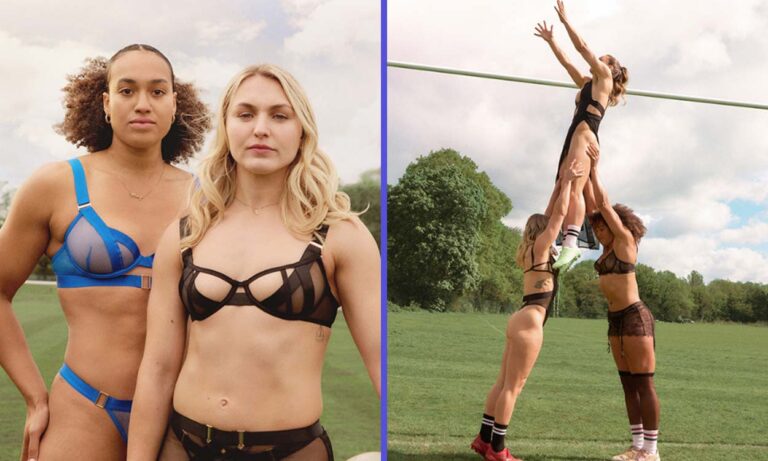Dear millennials, you’re wrong for hating on Bluebella’s Strong is Beautiful campaign featuring Team GB rugby stars
It’s been just over 24 hours since the British lingerie company Bluebella decided to launch its ‘Strong Is Beautiful’ campaign aimed at celebrating women with trained, muscular bodies. However, the campaign, which features three female British Olympic rugby players, seems to have gone viral for all the wrong reasons, sparking the all-so-familiar debate about sexualisation versus strength and sexual agency.
View this post on Instagram
View this post on Instagram
The idea behind Bluebella’s recent campaign is quite clear: lingerie companies usually spotlight small, delicate, and curvaceous female bodies because muscle, tone, and a smaller chest are more strongly associated with masculinity.
Thus, the #StrongIsBeautiful campaign aims to shatter these gendered beliefs about femininity and beauty by celebrating bodies that would be deemed ‘unattractive’ under these binary standards. And to drive the point home, the company hired acclaimed international rugby players Celia Quansah, Ellie Boatman and Jasmin Joyce to show off their trained physique in its newest sets.
“We want to celebrate and normalise the beauty of strong and powerful female bodies, bodies that have historically been ignored by the fashion industry and stigmatised by society,” Bluebella explained in its campaign statement.
It continued: “Our #StrongIsBeautiful campaign was born out of the fact that girls give up sports more readily than boys, partly because society does not equate the look of a strong female body with being beautiful or feminine. If young women do not equate strength with feminine beauty, it is a problem far beyond sport.”
Nevertheless, The Independent and The Telegraph did not seem to agree with this campaign’s approach, calling it “degrading” and “ridiculous.”
“Faced with a stiff training session ahead of the impending Olympic Games, the last thing sports aficionados would expect to encounter is these accomplished athletes practising their moves in a series of racy lace bras, knickers, teddies and suspenders. Where were their sports bras? In fact, where were their clothes?” The Telegraph’s Laura Craik questioned when confronted with this display of female sexuality.
The Independent, on the other hand, seemed more concerned by how images like these might impact young girls: “Somewhere along the way, the “confidence” message has become hopelessly confused with the “looking sexy” message. (…) Yes, it should be entirely acceptable for young women to have muscles and enjoy chasing a muddy ball and still feel attractive. But there’s no equivalent ad campaign for men, permitting rugby internationals to indulge their whim for sexy underwear so ladies will still like them.”
Some agreed with the publications that the campaign was sexist, tasteless, and undermined the accomplishments of these young women. Specific commentators even went as far as to say that campaigns like these would make sports seem less appealing to young women, creating another space where they would be unnecessarily sexualised.
My daughter didn't need to see pictures of women rugby players in lingerie to get into the sport - she loved it just from being given the chance to play. Perhaps the #strongisbeautiful campaign should concentrate on giving girls opportunities rather than sexist messages? https://t.co/tHvMoV4Vd0 pic.twitter.com/R8ow6wkMkn
— Justin Bowen (@JustinBowen71) July 2, 2024
By all means sell lingerie using rugby players but don’t try and badge it up as being in the service of getting teenage girls into sport. That is both batsh1it and creepy af 💀 https://t.co/zgdlQbPm5v
— BigRed Behind Bars 🚨 (@BigredNetball) July 3, 2024
"Feminine" is *not* wearing impractical, uncomfortable porn-inspired nylon underwear. "Feminine" is just what you happen to be when you're female, no effort required. This campaign is regressive and distasteful. Get your kit *on*, girls #strongisbeautiful https://t.co/Om9t61kueO pic.twitter.com/xVBMc7bP6z
— Nancy Drew (@Shaggers999) July 2, 2024
Others saw a display of multifaceted female identities in the ad and praised it for being innovative and progressive. They emphasised that sexiness shouldn’t be divorced from strength, power, and agency and also highlighted that this isn’t the first time Bluebella has tapped into female athletes. Apparently, the brand has photographed female athletes in lingerie for multiple years now to highlight fitness and make a statement about women being strong and beautiful.
Those criticising the Team GB’s women’s Olympic rugby players for their lingerie photo shoot have missed the point. Personally, I think they look great. They are real women who play in an aggressive sport. #WomenEmpowerment #rugby
— SMART_Supporter (@Support_SMART) July 4, 2024
strength is beautiful.
— Jessie Paege (@jessiepaege) January 13, 2018
strength is beautiful.
strength is beautiful.
strength is beautiful.
strength is beautiful.
strength is beautiful.
strength is beautiful.
As the internet continues to remain torn and divided over a debate that is as old as time, it is worth noting that male athletes have indeed posed in their underwire for multiple brands such as Calvin Klein, I-D, and GQ, without backlash like this.
Cruz Beckham makes his magazine cover debut in i-D's Spring 2022 Out of Body issue. Profile by me. Photos by Steven Klein. Styled by Alastair McKimm. 🙏
— douglas greenwood (@douglasgrnwd) February 21, 2022
Read it here: https://t.co/YzWoWyMkki pic.twitter.com/A6d1EpjJPX
David Beckham named the "Underwear Model of the Century"! Celebrate with his hottest pics: http://t.co/JNaycgUEKi pic.twitter.com/RbqVUpMNbk
— E! News (@enews) March 18, 2014
Cristiano Ronaldo strips down shirtless to his underwear for the Fall/Winter 2018 CR7 Underwear campaign!
— Cristiano Ronaldo News (@CRonaldoNews) September 13, 2018
For the campaign, which celebrates the 10th CR7 Underwear collection, the 33-year-old superstar athlete reclined in a giant ball pit. pic.twitter.com/g7aSAe8IuX
This criticism is almost exclusively limited to women because society views and consumes their bodies in a different way. On one hand, it sensitises and alerts people to the real and persistent issues of exploitation and subjugation. On the other hand, it turns their bodies into cultural battlegrounds and makes the frame through which they can way them incredibly limited and confusing. Yes, in our society women are vulnerable but they’re also strong and kick ass, which is, in fact, super sexy.






